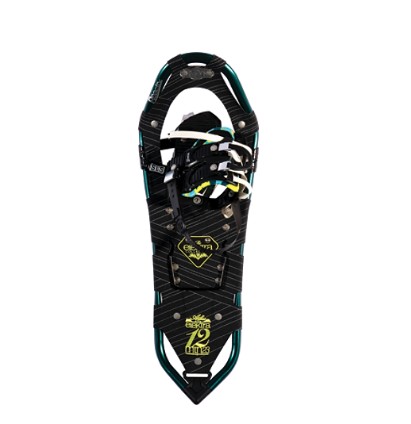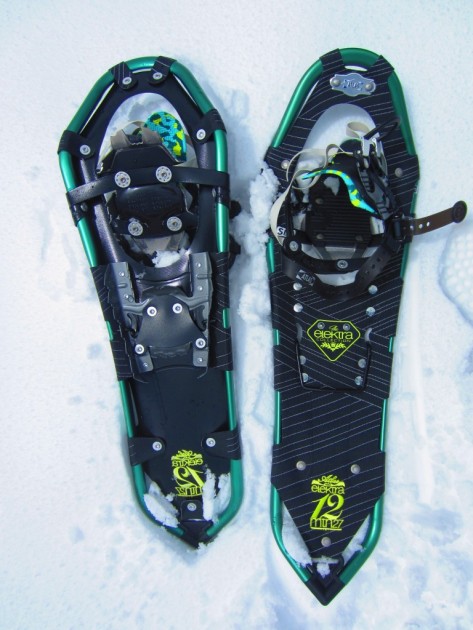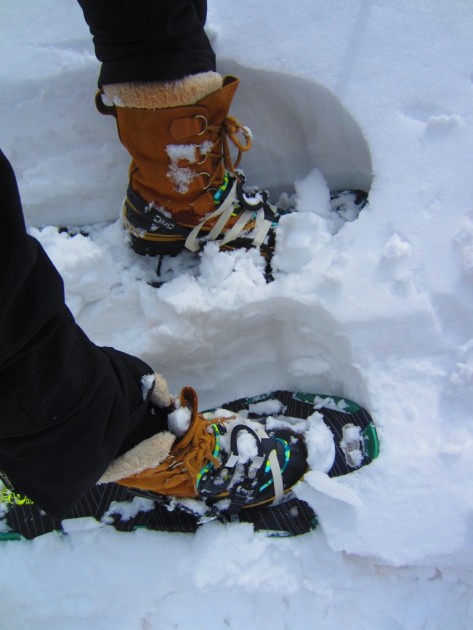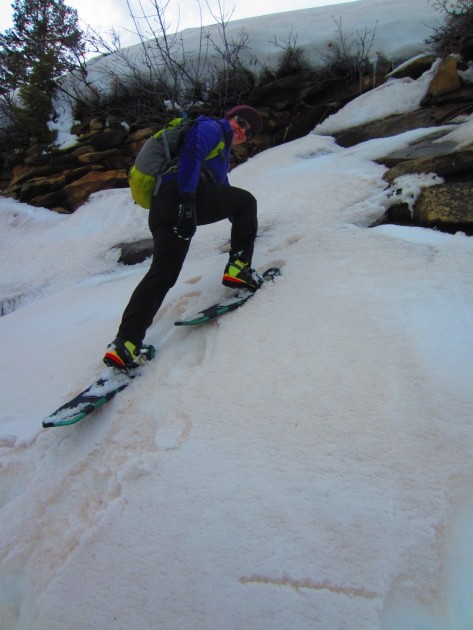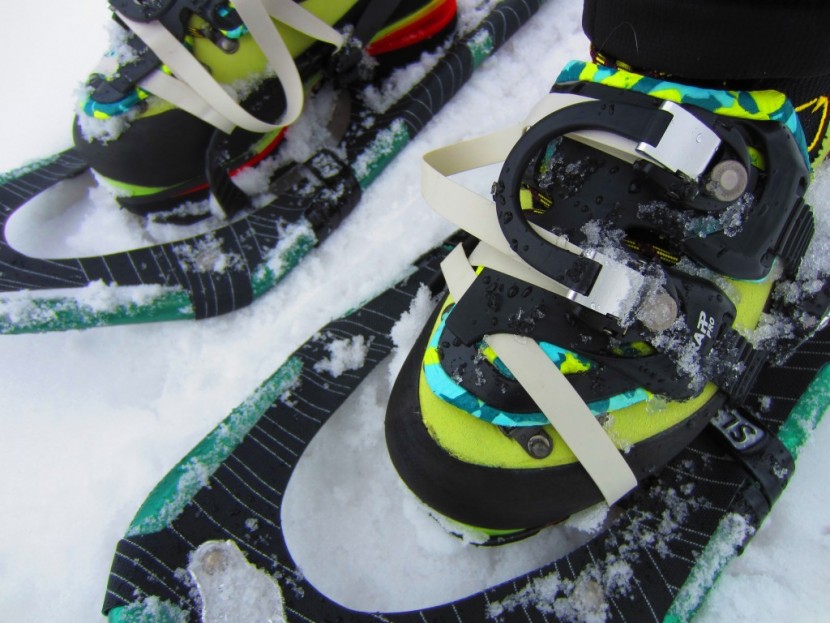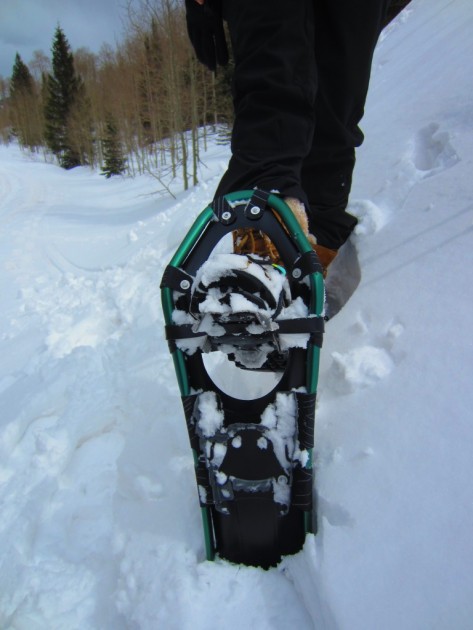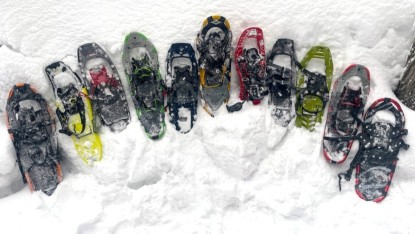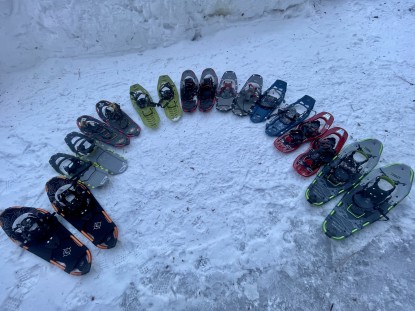Atlas Elektra 12 - Women's Review
Our Verdict
Our Analysis and Test Results
The Atlas Elektra 12 women's snowshoe has a femininely designed decking paired with anatomical frame shapes that join to create an excellent all-around pair of women's snowshoes.
Flotation
The size-to-weight ratio of the Atlas Elektra 12 snowshoes is comparable to the Editors' Choice MSR Lightning Ascent. A size 23 pair of Elektra 12s is 3lbs 11oz compared to the Lightning Ascents size 22, which weigh 3lb 13oz. The similar sizing and lightweight designs of both the Elektras and Lightning Ascents equate to excellent flotation. The Elektras have a narrow frame shape designed for the narrow gait of a woman's stride and therefore have less surface area. More surface area directly relates to better flotation, and if they had a slightly wider frame, they may achieve better flotation. The Duratek nylon decking and aluminum frames maintain the best flotation in recreational terrain. In backcountry conditions, such as steep or technical terrain, the shoes begin to sink. The MSR Lightning Ascents are far superior for backcountry, technical terrain.
Traction
These snowshoes have fixed rotation bindings with Zodiac crampons beneath the toes and Stabilock crampons beneath the heels. The crampon orientation and design is semi-aggressive. They have the best traction on packed snow that is moderately steep, but advanced terrain is better tackled with a more aggressive crampon design like the Torsion2 crampons and 360-degree traction frames found on the MSR Lightning Ascents.
Ease of Use
The Wrapp Pro bindings on the Elektra 12 are unique in design and function. Silicone straps that look similar to rubber bands cross over the top of the feet and through a low friction buckle system that secures closed with a flip of the handle. They look far more complex than they actually are, although replacing any parts would present a complexity that would demand a professional. The components, although durable and strong enough to endure our testing, if broken or damaged would be challenging to self-repair in the field.
The heel lift bar is extremely stiff and presented the most difficulty of any of the snowshoes in our review. Whether engaging or disengaging, the heel lift required a significant amount of effort to adjust. The MSR Lightning Ascent and Tubbs Mountaineer both have heel lift bars that lift easily with a quick flick up or down, yet remain engaged with security.
Security on Foot
The Wrapp Pro bindings secure the boots onto the snowshoes and remain fastened while active. The length of the tails add security and stability, but we found the most comfort with poles. Security on foot is excellent on packed snow as well as fresh snow. We didn't experience any issues concerning the bindings or traction systems loosening.
Best Applications
The Atlas Elektra 12 are ideal on intermediate trails and in moderate backcountry conditions, including some mountainous, non-technical terrain. They are suitable for novices and experts, but excel in the middle space between the two extremes. They have semi-aggressive traction systems that are appropriate in some backcountry applications such as moderately steep terrain and snow. They are ideal for petite women hiking on intermediate terrain.
The frame shape is tapered at the tail and particularly long to be considered an all-around snowshoe. On groomed trails, the tails kick up snow, despite the fixed rotation bindings. For an aggressive backcountry snowshoe, consider the MSR Lighting Ascents. For a novice snowshoe, consider the MSR Evo or Tubbs Wilderness - Women's.
Value
At $286, these are the second most expensive pair of snowshoes in our review. They lack the wide range of applications that other high priced snowshoes tend to have. For under $300, the MSR Lightning Ascents are aggressive snowshoes that have more technical features for backcountry use. While the Lightning Ascents are not versatile for novice snowshoeing, the features justify a higher price. The Elektra 12, on the other hand, does not have features that justify such a high price, and their range of ideal applications does not compare to snowshoes that are a fraction of the cost. The MSR Evo snowshoes cost under $150, are lightweight, and more versatile.
Conclusion
These women's-specific snowshoes ideal for the intermediate snowshoer. They are satisfactory for a beginner or an experienced winter hiker, but excel in the moderate range of terrain conditions, offering a balance between on-trail and off-trail snowshoeing.


